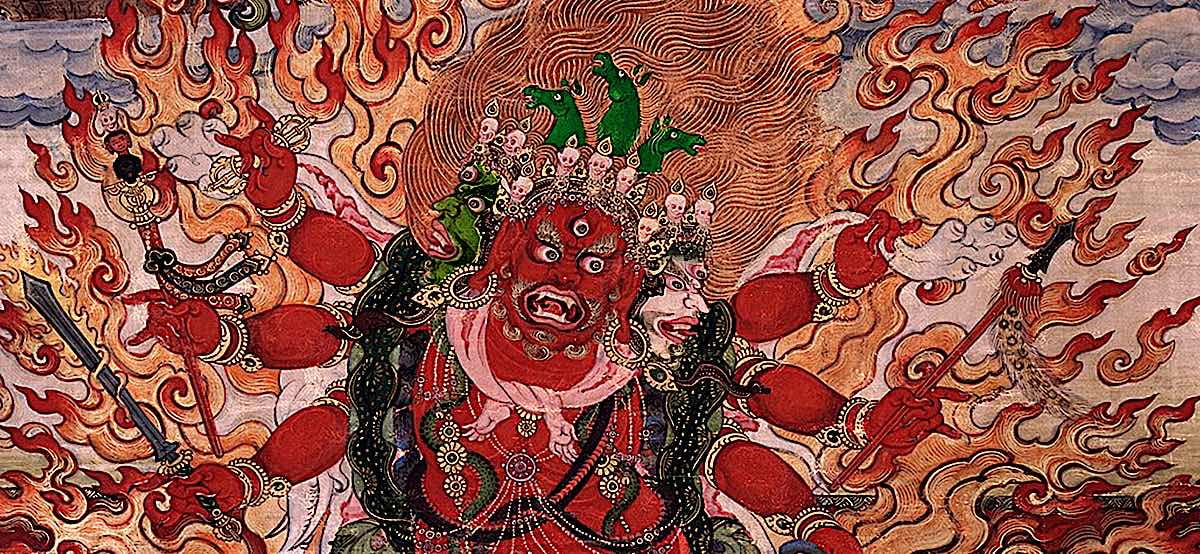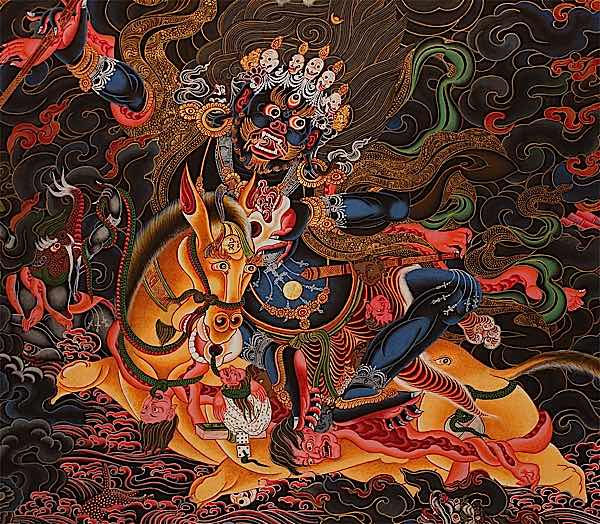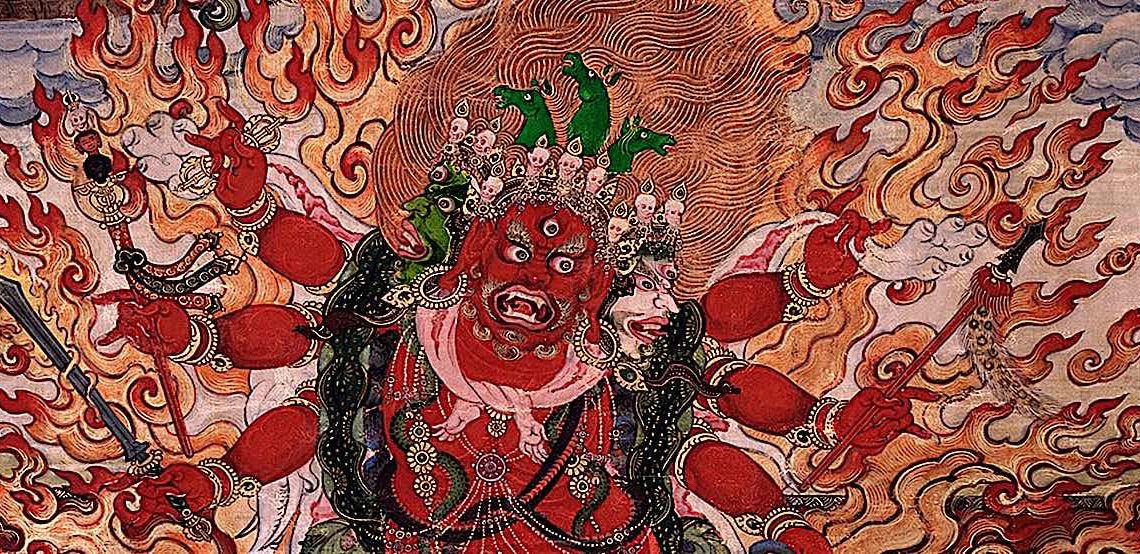“There are both male and female protectors (dharmapāla). Protectors are very extensive. They can be dharma protectors or worldly protectors. Your teacher is a dharma protector. A worldly protector can be someone who protects your country. There are protectors of your family and your beliefs. There are your personal protectors. There are guardian protectors who give you guidance. There are many of them. There are guides for food, for a journey, for your health, and during war. All these guides are like guardian angels.”
—Phakchok Rinpoche [1]

Three Jewels is Our Main Protection
Although the Three Jewels– Buddha, Dharma and Sangha — is always our main protection and our Buddhist Refuge, we can think of the Dharma Protectors as “our guardian angels” (just aas a metaphor, not literally!) as Phakchock Rinpoche explained (above.)
Dharma Protector Day is the monthly day we honour our metaphorical “guardian angels” or protectors, with puja practices or tea offerings. This special day, celebrated on the 29th day of each lunar month (the day before the New Moon), holds significant importance in the Vajrayana and Mahayana Buddhist calendar.
In Vajrayana Buddhism, the 29th day of the lunar month is considered an auspicious day and is observed as Dharma Protector Day – a day to honor and invoke the blessings of Dharma Protectors. This day, and these offerings are for all of the Dharma Protectors: Enlightened protectors, Yidam Protectors and Worldly Protectors. They protect the Dharma, and on the 29th day, we ask them to continue supporting and helping us.
A video on Palden Lhamo, the wrathful protector aspect of Tara, with a Tea Offering:
Who are the Dharma Protectors?
The term ‘Dharma Protectors’ or Dharmapalas refers to the protective deities like Mahakala and Palden Lhamo or Vaisravana. They tend to appear somewhat wrathful in appearance to symbolize their strong activities and power. They can be Enlightened, a few are Yidams, and many are Worldly (Worldly just means that like us, they are in the cycle of Samsara, and not yet Enlightened).
Their pivotal role is to create favorable conditions and remove any obstacles hindering progress on the spiritual path. The Dharmapalas may appear fearsome and wrathful, but this outward måanifestation is symbolic of their determination to overcome our inner obstacles and delusions. They can be Yidams, such as Hayagriva, or Enlightened Protectors such as Mahakala, or Worldly Protectors (unenlightened, still subject to karma and samsara) such as Vaisravana.
Quick Facts on Dharma Protector Day
- Dharma Protector Day is an auspicious occasion observed on the 29th day of the lunar month, considered the day before the New Moon (Source: Lion’s Roar). Usually we make tea offerings and perform protector Pujas.
- This day is dedicated to the honoring of Dharmapalas or Dharma Protectors, spiritual entities who create favorable conditions for spiritual growth by eliminating obstacles (Source: Britannica).
- Within Vajrayana Buddhism, Dharmapalas such as Mahakala, Palden Lhamo, and Vaisravana are honored for their assistance and commitment to safeguarding Dharma (Source: Lama Yeshe).
- Observing Dharma Protector Day is thought to strengthen the connection between practitioners and the Dharmapalas, thereby facilitating one’s spiritual journey (Source: Study Buddhism).
The Dharma Protector Puja Days in 2024
- January 10
- February: no protector puja March 9
- April 7
- May 7
- June 5
- July 4
- August 3
- September 1
- October 1, 31
- November 29
- December 29
Video on Black Mahakala, the Enlightened Protector:
Why is Dharma Protector Day important in Vajrayana Buddhism?
The purpose of Dharma Protector Day is not just a religious observance, rather it serves as a time for the believer to engage deeper in spiritual introspection and invocation to the protectors. As you explore Vajrayana Buddhism, this recognition and reverence of the Dharma Protectors can serve as an integral component of your spiritual journey.
There are eight famous Dharmapalas — often called the Eight Wrathful Ones — across many lineages (although lineages vary widely), and they are generally categorized in three ways:
- Wrathful Yidams (ishtadeveta) such as Hayagriva and Vajrabhairava (Yamantaka). Although they are wrathful and protectors, they are also Yidams (when we have permission and empowerment) and can be a wrathful personal deity. These are always wrathful emanations of the Buddhas: Hayagriva is wrathful Amitabha and Yamantaka is typically wrathful Manjushri. They are fully Enlightened and inseparable from all the Buddhas.
- Wisdom Protectors (or Enlightened Protectors), such as Mahakala and Palden Lhamo and Kalarupa (Yamadamaraja), as well as Begtse Chen. Although they are Enlightened, and are emanations of Buddhas, these are not Yidams so we usually don’t have permission to self-generate. In other words, we visualize them in front of us, with ourselves as our personal Yidam.
- Worldly Protectors such as Vaisravana (Riding a Lion) and Tsangpa Karpo (White Brahma). Worldly Protectors are powerful and helpful and protect the Dharma, and are oath-bound, but they’re not yet considered fully Enlightened as they remain, like us, in the Samsaric cycle. Examples include: Vaishravana (North king), Dhritarashtra (East), Virudhaka (South), Virupaksha (West).
These are the main Eight Dharmapals, although there are many, many others, especially in the Worldly Protectors, such as the Four Kings (Guardians of the Four Directions), the Guardians of the Ten Directions, and many more.
Yellow Jambhala is an Enlightened Aspect of Ratnsasambhava:
Who are the Eight Dharmapalas or Dharma Protectors?
These are the eight best known Dharmapalas, in alphabetical order:
- Begtse Chen — A warrior Enlightened protector of the Buddhist teachings. He is usually a Wisdom Protector, not a Yidam. Source: Himalayan Art
- Mahakala — Known as the ‘Great Black One’, associated with courage and protection. He is an Enlightened Protector and emanates from various Buddhas depending on the specific tantra or lineage, but we rarely self-generate or take him as a Yidam. Learn more about Mahakala in our full feature “Three Men in Black and the Miracles of Mahakala”>>
- Ekajati, Ugra Tara or Blue or Black Tara — She has different appearances but famously is depicted with one eye and one tooth, associated with spiritual transformation. She is fully Enlightened, as an emanation of Tara. Source: Himalayan Art
- Kalarupa, Yamadamaraja, or Yama — associated with wisdom and righteousness, and usually considered Enlightened but NOT a Yidam or personal practice. Source: Himalayan Art
- Palden Lhamo — The only female Dharmapala, revered as a fierce and Enlightened powerful protector, and also the protector of both Tibet and the Dalai Lama. Like Mahakala, she is Enlightened but not a personal Yidam. To learn more about Palden Lhamo, see our full feature>
- Tshangs pa — Known as the White Brahma, regarded as a worldly protector of monasteries and the Buddhist teachings. Source: Himalayan Art
- Vaisravana — Also known as Kubera, the Guardian of the Northern Direction. Although there is a tendency in many traditions to think of him as Wisdom Protector, he is usually considered Worldly, but very important. Learn More about Vaisravana in our feature>>
- Yamantaka or Vajrabhairava — Yamantaka is the “slayer of death” or “slayer of Yama” and is a fully Enlightened Protector as well as a Yidam (Highest Yoga Tantra generally, with permission only), associated with overcoming death and fear. To learn more about Yamantaka Vajrabhairava see our feature>>
Yamantaka as a Yidam as well as protector, explained in a Video:
Example: Three Protectors of the Lamrim in the Gelulg Tradition
Although there are many protectors with different specialties — each suited to the individual needs of various students– there are three main protectors in the Gelug traditions — although they are not exclusive to the Gelug school. Mahakala and Vaisravana are certainly common to all lineages. Most lineages honor and make offerings and practices toThree Protectors of the Lamrim, suitable for any Buddhist, who are:
- Mahakala (Tib: Nagpo Chenpo): Often depicted in a wrathful form to represent his relentless determination to safeguard Dharma, Mahakala is one of the most revered Dharma Protectors. According to Lama Zopa Mahaklala’s focus as a protector is “meditation, shamatha, the protector of meditation is Mahakala.”
- Vaisravana: Often called the “Northern King” and appearing as a wealth deity, Vaisravana (or Jambhala) is called upon not only for material abundance but also spiritual wealth. He clears away poverty and obstacles, enabling believers to practice the Dharma unhindered. He teaches us “morality” and especially generosity. Lama Zopa wrote: Vaisravana is the Protector of “the higher training of morality.”
- Kalarupa (Dharmaraja; Tib: Chögyal) according to Lama Zopa is the protector who helps us grasp “emptiness, the higher training of wisdom, that’s Kalarupa.

Lineage Protectors and Personal Protectors
Many of us have more specialized protectors. For instance, a devotee of Tara may feel drawn to her most wrathful emanation Palden Lahmo.
Then, many lineages and temples have specific protectors for their lineage or temple. For those, we are normally guided by our lineage and teachers. For example, Sera Je Monastery treasures Hayagriva as its protector.
Specialized Protectors
There are many lineages of specialized teachings on very focused protectors, such as White Mahakala, who is an Enlightened Protector who emanates from Avalokiteshvara. Or, Black Manjushri, a wrathful healing emanation of Manjushri. Or, Shabala Garuda, Lion-Faced Dakini and other practices which may be given to us as a special focus by our teachers.
These are typically Enlightened Protectors, usually not Yidams, although they can be. If you are taking a specialized deity as a Yidam, it should be with the permission of your teacher, together with empowerment and teachings.
Sources
[1] https://www.samyeinstitute.org/event/dharma-protector-day/2022-09-24/

